- Maruti Suzuki India
- Hyundai Motor India
- Tarun Garg
- CNG
- Mahindra & Mahindra
- Veejay Nakra
- Dow Jones Sustainability Index
- Toyota Kirloskar Motor
- Sabari Manohar
- JSW MG Motor India
- Windsor
- Nissan Motor India
- Saurab Vatsa
- Volvo Eicher Commercial Vehicles
- VECV
- Bajaj Auto
Automakers In India Ring In New Year With A Mixed Bag Of Results
- By MT Bureau
- January 01, 2025
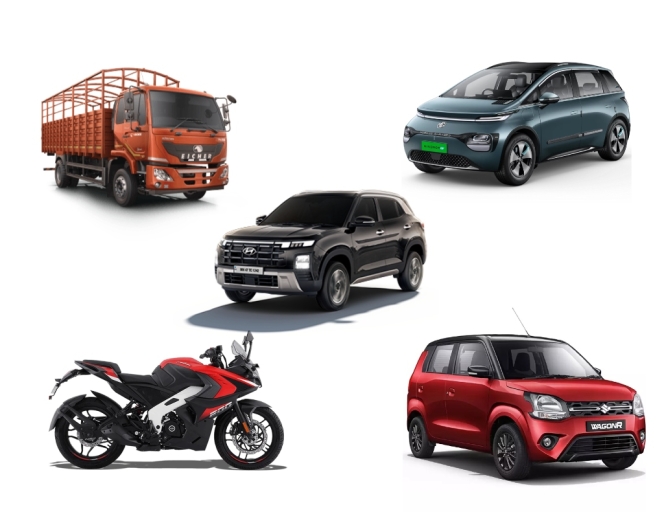
The first day of the new year has come with a slew of unexpected numbers for the automotive industry in India. In December 2024, automakers reported a wide variation in their wholesales ranging from strong robust double-digit growth to flat growth to even negative sales in the domestic market.
The country’s largest passenger vehicle manufacturer Maruti Suzuki India reported sales of 130,117 units in December 2024, up 24 percent YoY, as against 104,778 units for the same period last year.
Hyundai Motor India clocked 42,208 units for the same period, down 1.3 percent YoY, which it said was on the back of strong headwinds faced by the industry.
Tarun Garg, Whole-time Director and Chief Operating Officer, Hyundai Motor India, said, “HMIL has managed to sustain sales momentum in 2024, despite strong headwinds faced by the industry at large. Achieving highest ever domestic sales three years in a row, reflects customers’ preference for brand Hyundai as their trusted smart mobility solutions provider. Introduction of the innovative Hy-CNG Duo technology in 2024 resonated well with buyers, translating to the highest-ever CNG contribution of 13.1 percent to HMIL’s domestic sales in CY 2024, against 10.4 percent in CY 2023. By achieving highest ever yearly domestic sales of 1,86,919 units, Hyundai Creta continued to strengthen HMIL’s position as an SUV leader, helping HMIL accomplish highest ever domestic SUV contribution of 67.6 percent in CY 2024. We are confident that the upcoming Creta Electric, will further expand the appeal of this undisputed, ultimate SUV.”
Mumbai-based SUV maker Mahindra & Mahindra has constantly witnessed strong growth momentum on the back of its product offensive. The company clocked wholesales of 41,424 units, which was 17 percent higher YoY, as compared to 35,174 units for the same period last year.
Veejay Nakra, President, Automotive Division, Mahindra & Mahindra, stated, “We sold 41,424 SUVs, a growth of 18 percent and 69,768 total vehicles, a growth of 16 percent in December. The year ended on a high, as we became the only Indian auto company to attain the Dow Jones Sustainability Index (DJSI) world leader status within the Auto Sector. The DJSI ranking is one of the most respected global benchmarks for ESG performance, covering over 13,000 companies across various industries and we are ranked 1st among all global auto OEMs.”
Toyota Kirloskar Motor on its part sold 29,529 vehicles, which was 29 percent higher than 22,867 units sold for the same period last year.
Sabari Manohar, Vice-President, Sales-Service-Used Car Business, Toyota Kirloskar Motor, said, "We are immensely proud to close 2024 with a record-breaking performance, achieving an impressive 40 percent year-on-year growth. The SUV and MPV segments being key contributors grew at 20 percent over the same period last year. We are also observing a growing shift of consumer preferences towards vehicles offering sustainability, value proposition of dependability quotient, enhanced safety and better resale value which is boosting our sales.”
JSW MG Motor India’s bet on electric vehicles seems to have started to pay off. The company reported a 55 percent growth (albeit a low-year ago base) in December 2024 with sales of 7,516 units, as against 4,484 units last year.
Interestingly, the company witnessed 70 percent of its sales coming from its electric vehicle portfolio with the Windsor EV alone contributing sales of 3,785 units.
“The Windsor EV emerged as a market leader, despite market challenges. Our innovative Battery-As-A-Service offering and customer-centric mobility solutions continue to shape the future of India’s automotive landscape. Going forward, we will maintain our growth momentum while driving continuous disruption and innovation,” the company said in a statement.
Nissan Motor India reported sales of 2,118 units in the domestic market, which was down 1.5 percent as against 2,150 units sold for the same period last year. On the other hand, the company also announced that its popular Magnite SUV has crossed 10,000 booking milestone at the start of the new year.
Saurabh Vatsa, Managing Director, Nissan Motor India, said, “The year 2024 marked a transformative phase for Nissan in India as we embarked on the turnaround and introduced new models like the 4th Generation Nissan X-Trail and the new Nissan Magnite. This historic best sales performance in December also reflects the continued trust and enthusiasm of customers for our vehicles in both domestic and international markets. Our recent network expansion into cities like Nashik and Gorakhpur, along with the goal of achieving 300 touchpoints by the end of this fiscal year, reflects our focus on enhancing customer reach and experience across the country.”
“We remain committed to our dealers, partners and stakeholders in India and are focused on delivering the India turnaround plan. We are optimistic about building on this momentum to deliver even more value to our customers in the year ahead,” added Vatsa.
Volvo Eicher Commercial Vehicles reported a flat growth of 7,545 units as against 7,468 units it sold in the same month last year.
Bajaj Auto reported a negative growth of 19 percent with sales of 1,28,335 two-wheelers as against 1,58,370 two-wheelers it sold last year.
For Tata Motors, while the PV wholesales was in the green, the CV sales were in the red.
In December 2024, Tata Motors sold 44,230 passenger vehicles, up 1.7 percent, as against 43,470 units sold last year. On the other hand, the CV sales came at 32,369 units, down 0.9 percent, as against 32,668 units sold for the same period last year.
Girish Wagh, Executive Director, Tata Motors Ltd. said, “Sales in December 2024 were around 24 percent higher than those recorded in November 2024. Propelled by a resurgence in construction and mining activities post-monsoon, plus the festive season demand. Looking ahead, we expect demand to improve in Q4 FY25 across most segments of the CV industry. The key aspects to watch out in 2025 will be government’s focus on infrastructure spend, and growth in end use segments, which will augur well for the commercial vehicles industry.”
Shailesh Chandra, Managing Director, Tata Motors Passenger Vehicles and Tata Passenger Electric Mobility, said, “The PV industry posted moderate growth in CY24 and is expected to touch a sales volume of 4.3 million units, with strong growth in the SUV segment and sustained traction for emission-friendly powertrains. In Q3 FY25, the industry saw a strong revival, driven by increased retails in the festive season. For Tata Motors, CY24 was the fourth consecutive year of highest-ever annual sales with 565,000 units sold. We registered strong growth in our SUV portfolio with successful product introductions built on our proven multi-powertrain strategy. CNG volumes grew a substantial 77 percent with over 120,000 CNG vehicles sold in CY24. SUV volumes grew a robust 19 percent, with Punch selling over 200,000 units to emerge as the highest selling car model in India in CY24. Looking ahead, we remain optimistic about the outlook for the PV industry. With multiple product launches, innovations and a strengthened multi-powertrain strategy, Tata Motors is well poised for further growth in CY2025.”
| Company | Dec '24 | Dec '23 | Change (in %) |
| Maruti Suzuki India | 130,117 | 104,778 | 24.2% |
| Hyundai Motor India | 42,208 | 42,750 | -1.3% |
| Nissan Motor India | 2,118 | 2,150 | -1.5% |
| Mahindra & Mahindra | 41,424 | 35,174 | 17.8% |
| Bajaj Auto | 128,335 | 158,370 | -19.0% |
| Toyota Kirloskar Motor | 29,529 | 22,867 | 29.1% |
| Volvo Eicher Commercial Vehicles | 7,545 | 7,468 | 1.0% |
| JSW MG Motor India | 7,516 | 4,848 | 55.0% |
| Tata Motors (CV sales) | 32,369 | 32,668 | -0.9% |
| Tata Motors (PV sales) | 44,230 | 43,470 | 1.7% |
- IAC India
- Lumax Group
- IAC Group
- Mahindra
- VECV
- Maruti Suzuki India
- Skoda
- Volkswagen
- Stellantis
- Sunil Koparkar
IAC India Bets On Engineering Depth & Diversification, Targets 20% CAGR Growth Till FY2030
- By Nilesh Wadhwa
- February 28, 2026

Sunil Koparkar, Managing Director, IAC India, outlines the company’s strategy to reduce customer concentration, expand exports and leverage group synergies following its integration with the Lumax Group.
As India’s automotive interior market evolves towards premiumisation, localisation and faster product cycles, IAC India, part of the Lumax Group, is repositioning itself beyond a single-customer dependency model – without diluting its core partnerships.
IAC India continues to derive a significant share of its revenue from Mahindra’s passenger vehicle business. While the concentration remains high, Koparkar is clear that diversification will be driven through growth rather than dilution.
“Mahindra will always be our primary customer. We have a very strong strategic partnership. But we are also working on expanding with other OEMs and in the commercial vehicle space. Our goal remains a 20 percent CAGR,” he says.
For FY2025, IAC India USD 140 million in revenue, and is targeting a 20 percent growth in FY2026. The company counts Mahindra as its primary customer with almost 78 percent of its business coming from them, while Maruti Suzuki India (12%), Volvo Eicher Commercial Vehicles (5%), Skoda-Volkswagen (3%) and Stellantis (1%) contribute towards the remaining business.
 What’s more, responding to the company’s expansion plans, Koparkar revealed, that IAC Group, in addition to introducing new products, is also in talks with new-age players who have just entered Indian market (and also planning too) for supplying products.
What’s more, responding to the company’s expansion plans, Koparkar revealed, that IAC Group, in addition to introducing new products, is also in talks with new-age players who have just entered Indian market (and also planning too) for supplying products.
Currently, passenger vehicles account for roughly 90 percent of the business, with commercial vehicles forming the balance. Value-wise, Koparkar expects CV contribution to rise, even if percentage splits remain broadly similar due to the rapid growth of PV volumes.
Responding to a query on the potential growth from the CV segment, Koparkar said, “There is clear potential in CV interiors. As the CV market moves towards more comfortable cabins — with features like airbags, HVAC and infotainment — the opportunity for interior suppliers increases. Through Volvo Eicher, we have already helped drive that trend in India.”
When asked about the company’s expansion plans, Koparkar also stated that IAC Group is open to expanding to new regions as it aims to operate closer to its customers. One of the potential new projects for the company could very well be Chennai, as the company is in early talks with a new CV customer as well as VinFast.
Engineering as a Standalone Growth Lever
A key pillar of IAC India’s strategy is its expanding engineering capability. The company has been scaling up its R&D and product development team and increasingly positioning engineering services as a distinct revenue stream.
The company at present, employs over 300 engineers in India, which it aims to scale it upto 400-plus by next year and 500-plus in the coming few years.
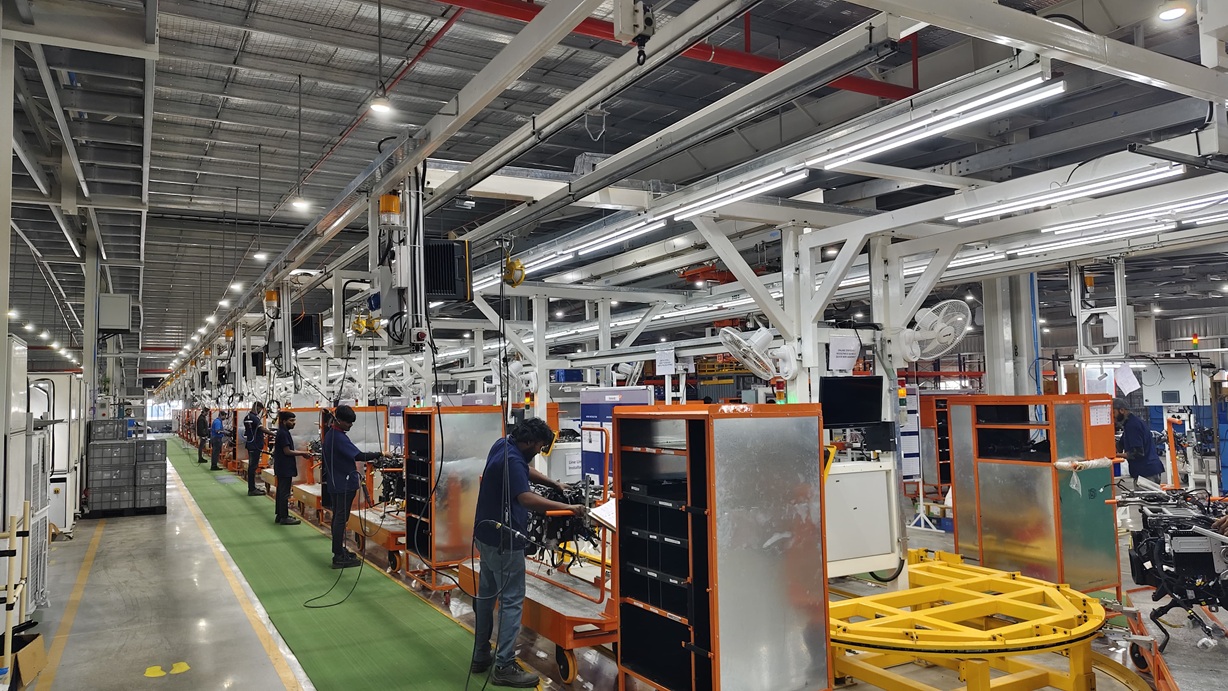
Historically, the Indian Engineering Centre supported the global IAC Group. “We were primarily the IAC Group engineering development centre. We will continue to provide those services. But now, besides global support, we are also offering engineering services to local OEMs,” Koparkar explains.
These services span studio collaboration, basic product design, CAE analysis and prototype development. In some cases, this can potentially evolve into full-scale supply programmes.
Importantly, innovation is now being formalised locally. “This year alone, we are in the process of filing about 30 patents,” he says. Earlier, intellectual property was subsumed under the global entity; now, filings are being initiated in India.
R&D investment remains aligned with group benchmarks at around 1.5–2 percent of revenue.
Exports: Measured Ambition
In terms of export potential, it currently contributes less than 5 percent towards the revenue, primarily through smaller kinematic parts. Direct exposure to the US market is negligible.
“Tariff-related uncertainty does not affect us because we do not export to the US,” Koparkar says. “Logistically, it does not make sense to ship our large interior parts there.”
Europe remains the primary export target. “The opportunity lies in leveraging our design capabilities and local development strengths. If logistics can be managed efficiently, there is room to grow.”
He also sees the Lumax Group’s aftermarket division as a future vehicle for export expansion.
Localisation and Supply Chain Resilience
On the localisation front, IAC India has made significant progress. “Last year was the first time we were able to localise over 99 percent of our tooling and development in India,” Koparkar states. Machinery on shop floors is largely localised, with only certain raw materials still imported.
The semiconductor crisis, he adds, had minimal direct impact. “We do not source electronics for our products — that is handled by the customer. However, from a development perspective, we are evaluating secondary substitutes for imported components, so we are prepared in case of disruptions.”
Premiumisation, Sustainability and AI
Premiumisation is currently the dominant interior trend. “Customers are moving away from basic plastics to more premium-feel interiors. Electronification is a big driver,” Koparkar says.
Sustainability, however, remains nascent in India. “There is no specific push for sustainable materials yet. What OEMs are looking for is lightweighting to meet upcoming CAFE norms. If a sustainable material delivers significant weight reduction, then it becomes serious.”
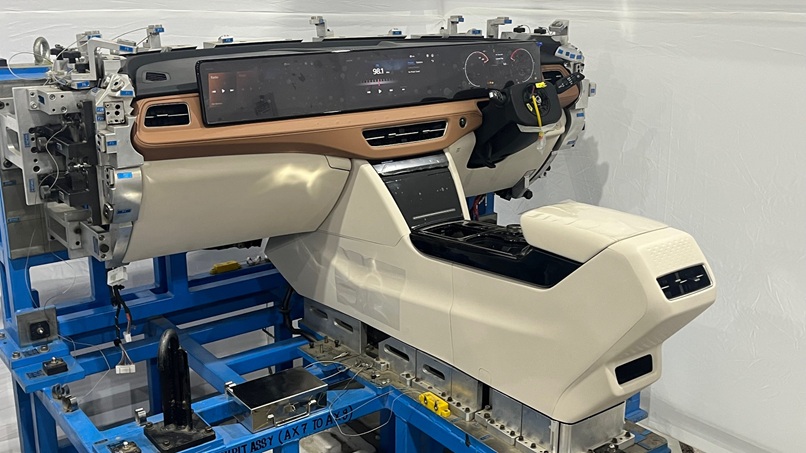
He points to jute, coir and bamboo fibres as potential alternatives but stresses that ecosystem-level collaboration is essential. “Unless a circular economy develops around us, sustainable materials will struggle to scale.”
On automation, operations across IAC’s six plants are roughly a 50:50 mix of automated and manual processes, depending on volume justification. Cobots and semi-automation are used where full automation does not offer viable returns.
AI, meanwhile, is expected to influence design more than manufacturing. “We see AI helping us accumulate design learnings and reduce design cycle times. Its impact will be more visible in engineering services than on the shop floor.”
Faster Development Cycles
Product life cycles are shrinking rapidly. “It used to take five years to develop a car,” Koparkar reflects. “With the XUV700, we worked with the customer to shrink that to 42 months. EVs are being developed even faster.”
As development timelines compress and interiors become more technology-intensive, IAC India is betting on engineering depth, localisation strength and group synergies to sustain its 20 percent growth ambition – while steadily broadening its customer and geographic footprint
- Rosmerta Technologies
- The Curious Bunch
- CII National Conclave on Road Safety
- Dr Rajesh Mohan
- Ravi Krishnamoorthi
- road safety
Rosmerta Launches Road Safety Comic Book For Schools
- By MT Bureau
- February 27, 2026
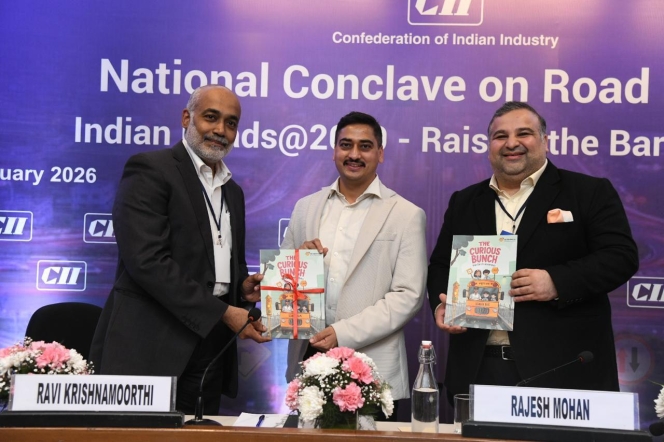
Rosmerta Technologies has launched a comic book titled ‘The Curious Bunch’ at the 3rd Edition of the CII National Conclave on Road Safety. The publication is designed to introduce road safety awareness to children.
The initiative aligns with the Government of India’s ‘4E’ strategy for road safety, which focuses on Engineering, Education, Enforcement and Emergency Care. The comic book aims to address the 168,000 road fatalities reported in India in 2022 by fostering safe habits at a school level.
The comic book uses illustrations to present road scenarios, including pedestrian conduct, school bus safety, traffic signals & the use of helmets, seatbelts and child restraint systems. By educating children, the company intends to influence the behaviour of parents and the wider community.
Rosmerta, a provider of mobility solutions, currently operates technology systems for automated driving tests and AI-based monitoring. The launch of ‘The Curious Bunch’ marks an expansion of its activities into the education pillar of the national safety framework.
Dr Rajesh Mohan, DCP, Gurugram Traffic, said, “When we educate children and instil strong moral and ethical values, the impact travels far beyond the classroom. Children naturally share what they learn. They question, they explain, and they influence conversations at home. In many ways, they become powerful advocates, encouraging their parents to be more aware, more responsible, and more engaged. Over time, this awareness translates into action, because parents are also drivers, commuters, and decision-makers on the road.”
Ravi Krishnamoorthi, Group President, Rosmerta Technologies, said, “Every road accident statistic hides a parent’s anxiety. In 2022 alone, India reported over 168,000 road accident fatalities, according to government data. Road safety is not merely about compliance; it is about compassion and collective responsibility. When a child understands why a red light matters or why a helmet can save a life, they don’t just learn a rule - they become ambassadors of safety within their families and communities. Through ‘The Curious Bunch’, we aim to nurture this awareness early, because the habits we shape in children today will define the safety culture of our nation tomorrow.”
- Maruti Suzuki India
- Transport Department of Tamil Nadu
- Automated Driving Test Tracks
- ADTT
- M K Stalin
- RTO
- CMVR
- Rahul Bharti
Maruti Suzuki Commissions Seven Automated Driving Test Tracks In Tamil Nadu
- By MT Bureau
- February 27, 2026
Maruti Suzuki India, in partnership with the Transport Department of Tamil Nadu, has announced the commissioning of seven Automated Driving Test Tracks (ADTTs) in the state. The facilities were inaugurated by the Chief Minister of Tamil Nadu, M K Stalin.
The tracks are located at Regional Transport Offices (RTOs) in Coimbatore (Central), Tiruvannamalai, Krishnagiri, Madurai (North), Sivagangai, Dindigul, and Tiruchirappalli (West). These sites form part of a Memorandum of Agreement to automate ten tracks across the state, with the remaining three at Tirunelveli, Tuticorin and Marthandam scheduled for operation shortly.
The ADTTs are designed to evaluate applicants for two-wheeler and Light Motor Vehicle (LMV) licences. The system removes human intervention from the evaluation process to ensure objective testing according to the Central Motor Vehicle Rules (CMVR).
Key technical components include:
- Video Analytics: High-definition cameras to monitor vehicle movement and path adherence.
- Sensors: Radio Frequency Identification (RFID) and Harnessing AutoMobiles for Safety (HAMS) technology.
- Identification: Face-recognition systems to verify candidate identity.
- Results: Integrated IT systems that generate test results automatically based on real-time data.
The carmaker has commissioned 56 ADTTs across eight states, including Uttar Pradesh, Delhi, and Bihar. Following the completion of agreements with Rajasthan and Andhra Pradesh, the company’s footprint is expected to reach 81 tracks nationwide.
Rahul Bharti, Senior Executive Officer, Corporate Affairs, Maruti Suzuki India, said, “As part of Maruti Suzuki’s road safety initiatives implemented across multiple states, we are partnering with the Government of Tamil Nadu to strengthen the driver licensing evaluation process through the deployment of 10 Automated Driving Test Tracks (ADTTs). Equipped with high-definition cameras and advanced analytics, these ADTTs enable a comprehensive, efficient, and transparent assessment process. It eliminates any human bias and ensures that only skilled drivers are awarded a license.”
“According to data shared by the Ministry of Road Transport & Highways, India witnessed 1.77 lakh road accident deaths in 2024. Promoting disciplined driving practices and ensuring rigorous driver evaluation are vital to prevent road accidents and augment road safety across the country,” he said.
BYD To sponsor BVRLA Annual Dinner 2026
- By MT Bureau
- February 26, 2026
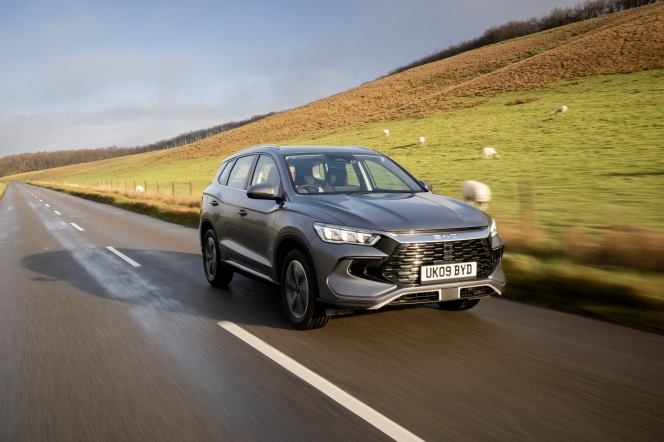
BYD, the world’s leading manufacturer of New Energy Vehicles, will once again serve as the headline sponsor for the British Vehicle Rental and Leasing Association (BVRLA) Annual Dinner in 2026. This marks the third consecutive year the company has supported the prestigious event, which is set to take place on 4 March 2026 at the JW Marriott Grosvenor House Hotel on Park Lane, London. The dinner is widely recognised as the premier gathering for professionals across the rental, fleet management and leasing sectors.
Through its ongoing sponsorship since 2024, BYD reaffirms its commitment to this vital segment of the UK automotive market. The company’s expanding presence was underscored in 2025 by the introduction of several new models, including the SEALION 7, DOLPHIN SURF, SEAL 6 Saloon and Touring and the ATTO 2. These launches contributed to significant sales figures, with 21,824 units delivered to fleet customers and 5,964 to the rental sector. The momentum has continued into 2026 with the debut of the SEALION 5 DM-i, while the ATTO 2 DM-i and ATTO 3 EVO are expected to arrive shortly. Supporting this growth is a dedicated UK fleet team of 11 specialists, offering tailored product and service expertise.
The BVRLA represents around 1,000 member organisations, ranging from SMEs to large public companies, all operating within or alongside the UK’s vehicle rental and leasing industries. By engaging with government and upholding professional standards, the association enables its members to provide safe, sustainable and accessible transport solutions. This year’s Annual Dinner will feature the presentation of the Industry Hero Awards and live entertainment from award-winning comedian Tom Ward, celebrating excellence across the sector.






Comments (0)
ADD COMMENT